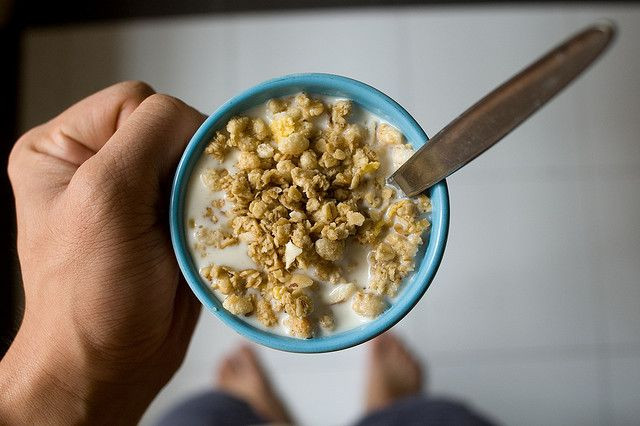Skipping Breakfast, Midnight Snacking May Elevate Your Risk For A Heart Attack, Coronary Heart Disease

You may be doing your heart a huge favor by eating breakfast in the morning and by staying away from midnight snacks. Men who skip a morning meal or enjoy late-night munchies have a higher risk for heart attack and coronary heart disease, according to a new study published in the journal Circulation.
Breakfast has long held the title as "most important meal of the day," namely with children. Kids who start their days with a healthy meal have improved concentration and are more alert, according to the Mayo Clinic. Breakfast also makes it easier for children to meet their daily nutritional requirements for vitamins and minerals
However, few studies have been conducted to examine whether the same holds true for adults.
"Our study group has spent decades studying the health effects of diet quality and composition," said senior author Dr. Eric Rimm. "This new data also suggests overall dietary habits can be important to lower risk of coronary heart disease," said Eric Rimm, an associate professor of medicine and public health at Harvard.
Rimm and his colleagues claim their new investigation is the first to draw conclusions on the link between eating habits and coronary heart disease, which is the leading cause of death in the U.S. — 385,000 in 2009 — although more than half of these deaths occur in men.
From 1992 to 2008, Rimm and his colleagues surveyed the eating habits of 27,000 men every two year. The male subjects, who in the beginning had no history of heart disease or cancer, also reported if they developed or were diagnosed with a cardiovascular disorder during the course of the study.
When they compared eating habits to the occurrence of coronary heart disease, they found that those who skipped breakfast were 27 percent more likely to suffer a heart attack or death because of the cardiac affliction.
"Skipping breakfast may lead to one or more risk factors, including obesity, high blood pressure, high cholesterol and diabetes, which may in turn lead to a heart attack over time," said lead author Dr. Leah Cahill, a postdoctoral research fellow in the Department of Nutrition at Harvard School of Public Health.
Is this the whole story?
But does this trend really apply to everyone? This research was a follow-up investigation of the Health Professionals Follow-up Study (HPFS), which is a health survey of dentists, veterinarians, pharmacists, optometrists, osteopaths, and podiatrists that has been ongoing in the U.S. since 1986.
Medical professionals are thought to be healthier than the general population, so it is possible that "the breakfast benefit" was simply a side effect of this study group being more familiar with the rules of well-being.
For instance, late-night snacking was also linked to 55 percent higher risk for heart disease, but the "researchers were less convinced this was a major public health concern because few men in the study reported this behavior," according to the press release.
In addition, 97 percent of the study population was white and of European descent, but African-Americans have the highest incidence of coronary heart disease in the U.S. Thus, further research in other ethnicities and in women is needed, although the authors believe the findings should apply to these groups.
Although breakfast has been linked weight loss, better memory, and lower cholesterol, it is unlikely to be very beneficial if a person picks the wrong menu.
"Incorporating many types of healthy foods into your breakfast is an easy way to ensure your meal provides adequate energy and a healthy balance of nutrients, such as protein, carbohydrates, vitamins and minerals," said Cahill. "For example, adding nuts and chopped fruit to a bowl of whole grain cereal or steel-cut oatmeal in the morning is a great way to start the day."
Source: Cahill LE, Chiuve SE, Mekary RA, et al. Prospective Study of Breakfast Eating and Incident Coronary Heart Disease in a Cohort of Male US Health Professionals. Circulation. 2013.
Published by Medicaldaily.com



























